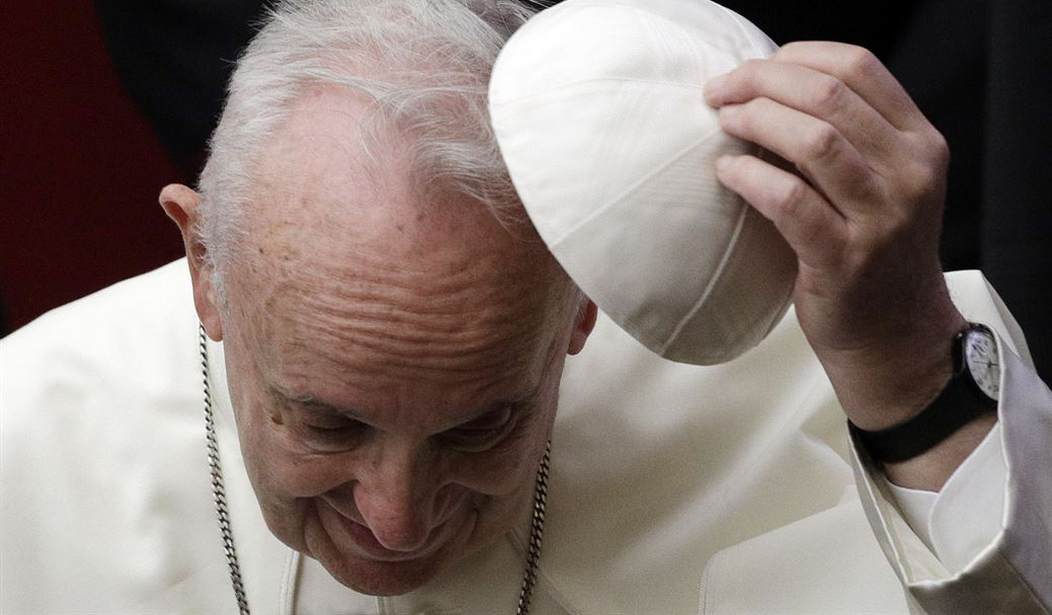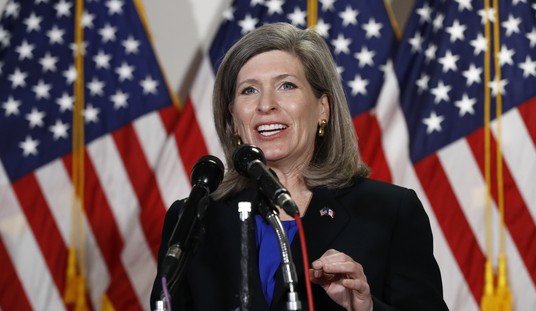I hate to say I told you so, but … actually, I love to say I told you so. Pope Francis drove a stake through speculative-journalism reports of his alleged plans to retire, as well as rumors that the pontiff has cancer. He told Reuters in a one-on-one interview that his recent health issues are improving:
Pope Francis has dismissed reports that he plans to resign in the near future, saying he is on track to visit Canada this month and hopes to be able to go to Moscow and Kyiv as soon as possible after that.
In an exclusive interview in his Vatican residence, Francis also denied rumours that he had cancer, joking that his doctors “didn’t tell me anything about it”, and for the first time gave details of the knee condition that has prevented him carrying out some duties.
Read on to find out where the pope’s health stands, but it’s clear that he can actually stand, and walk, and still do his job. Like many people in their eighties, Francis has more health issues than in the past, but they aren’t disabling or even an obstacle to doing his job on a day-to-day basis. Those health concerns and the itinerary that started off the rumor mill — a visit to L’Aquila, the site of the grave of Celestine V — have no meaning at all, an amused Francis revealed:
L’Aquila is associated with Pope Celestine V, who resigned the papacy in 1294. Pope Benedict XVI visited the city four years before he resigned in 2013, the first pope to do so in about 600 years.
But Francis, alert and at ease throughout the interview as he discussed a wide range of international and Church issues, laughed the idea off.
“All of these coincidences made some think that the same ‘liturgy’ would happen,” he said. “But it never entered my mind. For the moment no, for the moment, no. Really!”
The Francis-retirement rumor mill was always significantly suspect. Leave out the very real issue of creating a three-pope Vatican when a two-pope Vatican has been troublesome enough. In some ways, Francis has just gotten his reform pieces arranged on the Holy See’s playing board. Francis needs to remain in charge long enough to make his reforms laid out this March in Praedicate Evangelium stick for a long time into the future. This isn’t the moment for retiring — it’s the moment to commit to sticking around for years on end to ensure no backsliding on reform. Francis can’t do that from an “emeritus” perch, not without undermining a successor.
Small wonder that Francis was laughing while addressing this issue. He still won’t take retirement off the table, but it’s almost a certainty that he won’t exercise that option while Pope Emeritus Benedict XVI is still around, and maybe not ever unless Francis becomes truly unable to conduct business.
He’s certainly adept enough to inject himself into the abortion debate in the United States. In the same interview, Francis told Reuters that procuring an abortion to deal with an unwanted pregnancy was the equivalent of “hiring a hit man“:
The Pope has re-emphasized his opposition to abortion in the wake of the controversial U.S. ruling to overturn Roe v. Wade, describing the medical procedure as akin to “hiring a hit man.”
Pope Francis was asked about the court’s decision, but said he did not have enough information to speak about it from a legal perspective. Instead, he reiterated the Catholic Church’s teachings that life begins at the moment of conception.
He reportedly compared abortion to “hiring a hit man” and said: “I ask: Is it legitimate, is it right, to eliminate a human life to resolve a problem?”
The pontiff has used this argument before:
It is not the first time the Pope has drawn the controversial comparison. Back in May 2019, whilst speaking at a Vatican-sponsored anti-abortion conference, he said: “Is it licit to throw away a life to resolve a problem? Is it licit to hire a hit man to resolve a problem?”
The USCCB might ask that same question, and about Catholic politicians that make hiring the hit man possible in the first place. Pope Francis wasn’t as forthcoming on that point:
Francis was asked about a debate in the United States over whether a Catholic politician who is personally opposed to abortion but supports others’ right to choose should be allowed to receive the sacrament of communion. …
“When the Church loses its pastoral nature, when a bishop loses his pastoral nature, it causes a political problem,” the pope said. “That’s all I can say.”
That’s all he’s choosing to say. Nancy Pelosi got communion at the Vatican last week, but that means less than what it seems. It would be helpful for the Holy Father to complete the analogy on hiring hitmen and take it to its logical conclusion, however.








Join the conversation as a VIP Member